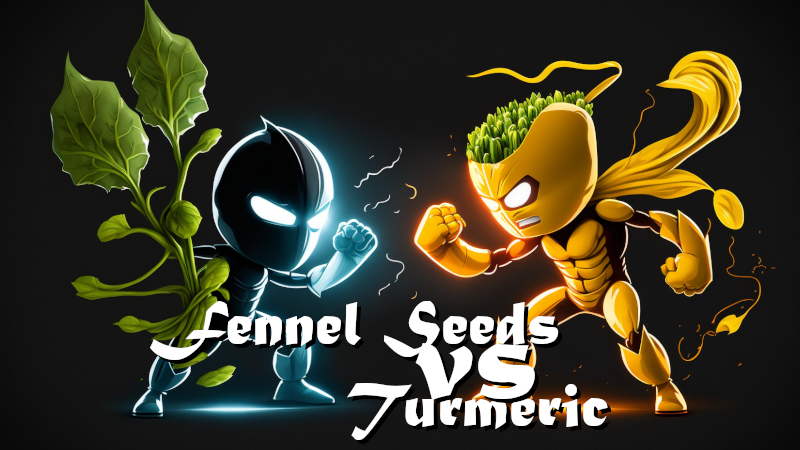Fennel seed and turmeric are two herbs that have been used for centuries for their medicinal properties. Both are known for their ability to promote gut health and help with parasite cleansing. The turmeric benefits when compared to fennel seed is a little explored topic of conversation.
In this article, we will seek to compare the popular ingredient, turmeric, as used in many traditional medicines to fennel seeds.
Fennel seeds have been used for centuries to treat various digestive issues, including bloating, gas, and stomach cramps. We will dive into that deeper as we go on.
Turmeric, on the other hand, is a spice that has been used in Ayurvedic medicine for thousands of years and is known for its anti-inflammatory properties. It has grown in popularity dramatically in recent years.
Table of Contents
Turmeric Benefits Compared to Fennel Seeds
While both fennel seed and turmeric have been used for centuries to promote gut health, they have different mechanisms of action.
Fennel seed is known to have carminative properties, which means it helps to relieve gas and bloating in the digestive tract. It is also known to have antispasmodic properties, which can help to relieve stomach cramps. 1 2
Turmeric benefits, on the other hand, are known to include it having anti-inflammatory properties, which can help to reduce inflammation in the gut and promote overall gut health. 3

Turmeric Benefits for Parasite Cleansing Compared to Fennel Seeds
When it comes to parasite cleansing, both fennel seed and turmeric have been shown to have some effectiveness.
Fennel seed has been shown to have antiparasitic properties and has been used to treat various parasitic infections. 4 5 6 7
Turmeric has also been shown to have antiparasitic properties, particularly against schistosomiasis (also referred to as bilharzia), a parasitic infection that affects millions of people worldwide. 8 9
However, more research is needed to fully understand the effectiveness of these herbs for parasite cleansing.
Fennel seeds are derived from the fennel plant, which is a hardy, perennial, umbelliferous herb with yellow flowers and feathery leaves.
Studies have also shown that fennel seeds contain compounds that have antimicrobial properties, making them effective against a variety of parasites, including tapeworms and roundworms. 10 11
Additionally, fennel seeds are rich in fibre, which helps to promote bowel regularity and prevent constipation, which can be a breeding ground for parasites.

Turmeric, also known as Curcuma longa, is a rhizomatous herb of the family Zingiberaceae.
It is mostly used as a spice, a colouring agent, and broadly used in traditional medicine to treat various ailments, including digestive issues, inflammation, and infections. 12
Turmeric contains a powerful compound called curcumin, which has been shown to have anti-inflammatory, antioxidant, and antiparasitic properties, which is understood to help alleviate symptoms of digestive disorders and promote overall gut health.
Studies have shown that curcumin can help eliminate bacteria and parasites from the gut by disrupting their cellular membranes and inhibiting their growth. 13
Overall, both fennel seeds and turmeric have been shown to have beneficial effects on gut health and parasite cleansing.
Incorporating these natural remedies into your diet can help to promote a healthy gut and eliminate parasites naturally.
We have also written a comprehensive guide on Ashwagandha vs Turmeric for you to be able to grasp more knowledge on how Turmeric and Ashwagandha work.
Gut Health and Parasite Cleanse
How to Use Fennel Seeds and Turmeric for Gut Health and Parasite Cleanse
To use fennel seeds for gut health, you can make tea by steeping 1 teaspoon of crushed fennel seeds in a cup of hot water for 5 to 10 minutes.
You can also chew on fennel seeds after meals to aid in digestion. If you’re in an Indian restaurant, keep an eye out for Mukhwas. This is a popular after-meal digestive snack, which is often found at the counter where you pay. It is used widely in Indian culture where most Western cultures would offer a bowl of mints (mint confectionery).

For parasite cleanse, fennel seeds can be combined with other herbs such as black walnut and cloves to create a natural parasite cleanse.
Turmeric can be consumed in various forms, including fresh or dried root, powder, or capsules.
To make turmeric tea, you can steep 1 teaspoon of turmeric powder in hot water for 5-10 minutes. You can also add turmeric powder to your meals or take turmeric capsules.
It’s important to note that turmeric can interact with certain medications and should be used with caution if you have a history of gallbladder issues.
Precautions and Side Effects
While fennel seeds and turmeric are generally safe when consumed in moderation, there are some precautions and side effects to be aware of.
Fennel seeds can cause allergic reactions in some people. If you are allergic to Peach, you may have a fennel seed allergy too. These seeds should also be avoided by pregnant women as they may stimulate uterine contractions. 14 15
Despite the turmeric benefits on offer, it can cause gastrointestinal issues such as nausea and diarrhea in high doses and should be used with caution if you have a history of liver or kidney disease. There have also been anecdotal reports of it resulting in a depletion of iron levels in some people. 16
FAQs
What are the Benefits of Fennel Seed for Gut Health?
Fennel seed has been traditionally used for digestive issues such as bloating, gas, and indigestion.
It contains anethole, a compound that has anti-inflammatory properties and can help soothe the digestive tract. Fennel seed also has antimicrobial properties that can help fight off harmful bacteria in the gut.
Additionally, fennel seed can act as a natural laxative and promote regular bowel movements.
What are the Turmeric Benefits for Gut Health?
Turmeric contains curcumin, a compound that has anti-inflammatory and antioxidant properties.
These properties can help reduce inflammation in the gut and protect against oxidative stress.
Turmeric can also help stimulate the production of bile, which aids in digestion and can help prevent the buildup of harmful toxins in the gut.
Additionally, turmeric has been shown to have anti-parasitic effects and can help rid the gut of harmful parasites.
Which is better for gut health: fennel seed or Turmeric?
Both the fennel seed and turmeric benefits to be found play a part in supporting gut health. Which one is better for you may depend on your specific needs.
Fennel seed is particularly helpful for digestive issues such as bloating and gas, while Turmeric is better known for its anti-inflammatory and antioxidant properties.
However, both can be used together as part of a comprehensive gut health regimen.
How can I incorporate fennel seed and Turmeric into my diet?
Fennel seed can be added to dishes such as soups, stews, and roasted vegetables, or brewed as a tea.
Turmeric can be added to dishes such as curries, smoothies, and golden milk, or taken as a supplement.
It is important to note that Turmeric is not well absorbed by the body on its own, and should be consumed with black pepper or a fat source such as coconut oil to enhance absorption.
Conclusion
Both fennel seeds and turmeric offer significant benefits for gut health and parasite cleansing. Fennel seeds excel in relieving gas, bloating, and stomach cramps, while turmeric’s anti-inflammatory and antioxidant properties promote overall gut health.
While research on their efficacy for parasite cleansing is ongoing, incorporating both fennel seeds and turmeric into your diet can support a healthy gut and help eliminate parasites naturally.
Each herb can be consumed in various forms, such as teas or added to meals, but it is important to be aware of potential side effects and interactions with certain medications.
What are your thoughts on the Fennel Seed and Turmeric benefits for gut health? Share your thoughts on Instagram and Pinterest.
References
- “Handbook of Herbs and Spices, Volume 2” – K. V. Peter, 2012 [ScienceDirect] [Archive] ↩︎
- “Foeniculum vulgare Mill: A Review of Its Botany, Phytochemistry, Pharmacology, Contemporary Application, and Toxicology” – S. B. Badgujar, V. V. Patel, A. H. Bandivdekar, Date [PubMed] [Archive] ↩︎
- “Anti-Inflammatory Effects of Curcumin in the Inflammatory Diseases: Status, Limitations and Countermeasures” – Y. Peng, M. Ao, B. Dong, Y. Jiang, L. Yu, Z. Chen, C. Hu, R. Xu, 2 November 2021 [PubMed] [Archive] ↩︎
- “Effect of Foeniculum Vulgare Aqueous and Alcoholic Seed Extract against Zoonotic Cutaneous Leishmaniasis” – G. Mostafa, N. Jalallou, S. J. Seyyedtabaei, A. Dadashi, S. E. S. Sabour, 31 March 2021 [PubMed] [Archive] ↩︎
- “Bioactivity, Physicochemical and Sensory Properties of Probiotic Yoghurt Made from Whole Milk Powder Reconstituted in Aqueous Fennel Extract” – E. S. Atwaa, M. R. Shahein, E. S. Abd El-Sattar, H. H. Ali Hijazy, A. Albrakati, E. K. Elmahallawy, 27 November 2021 [MDPI] [Archive] ↩︎
- “Diabetes mellitus and oxidative stress—A concise review” – A. Ullah, A. Khan, I. Khan, 5 March 2015 [ScienceDirect] [Archive] ↩︎
- “The hepatoprotective effects of fennel seeds extract and trans-Anethole in streptozotocin-induced liver injury in rats” – Z. S. Noshahr, M. A. R. Hadjzadeh, R. M. Marjaneh, A. K. Rad, 30 December 2020 [Wiley] [Archive] ↩︎
- “In vivo assessment of the antischistosomal activity of curcumin loaded nanoparticles versus praziquantel in the treatment of Schistosoma mansoni” – K. M. Mokbel, I. R. Baiuomy, A. E. H. Sabry, M. M. Mohammed, and M. A. El-Dardiry, 25 September 2020 [PubMed] [Archive] ↩︎
- “Schistosomiasis” – WHO Staff, 1 February 2023 [WHO] [Archive] ↩︎
- “Parasites: Leishmaniasis – Biology” – CDC Staff, 18 February 2024 [CDC] [Archive] ↩︎
- “Technical Report – Fenbendazole” – B. Baker, J. Jacob, D. Currier, L. Kishter, R. Lanspa, 13 May 2020 [USDA] [Archive] ↩︎
- “Curcumin: A Review of Its’ Effects on Human Health” – S. J. Hewlings, D. S. Kalman, 22 Octber 2017 [PubMed] [Archive] ↩︎
- “Curcumin activation of a bacterial mechanosensitive channel underlies its membrane permeability and adjuvant properties” – R. Wray, I. Iscla, P. Blount, 23 December 2021 [PubMed] [Archive] ↩︎
- “Hypersensitivity to fennel is frequent in peach allergic patients and LTP is a major fennel allergen” – C. Stafylaraki, L. Farioli, J. Scibilia, M. G. Giuffrida, A. Mascheri, V. Pravettoni, C. Baro, M. Piantanida, L. Primavesi, M. Nichelatti, A. Marocchi, J. W. Schroeder, E. A. Pastorello, 12 August 2011 [PubMed] [Archive] ↩︎
- “Occupational Allergic Rhinoconjunctivitis and Asthma due to Fennel Seed” – H. J. Schwartz, R. T. Jones, A. R. Rojas, D. L. Squillace, J. W. Yunginger, January 1997 [ScienceDirect] [Archive] ↩︎
- “Turmeric – Uses, Side Effects, and More” – WebMD Staff, Last Checked 26 April 2023 [WebMD] [Archive] ↩︎
Last Updated on 4 months by D&C Editorial Team


